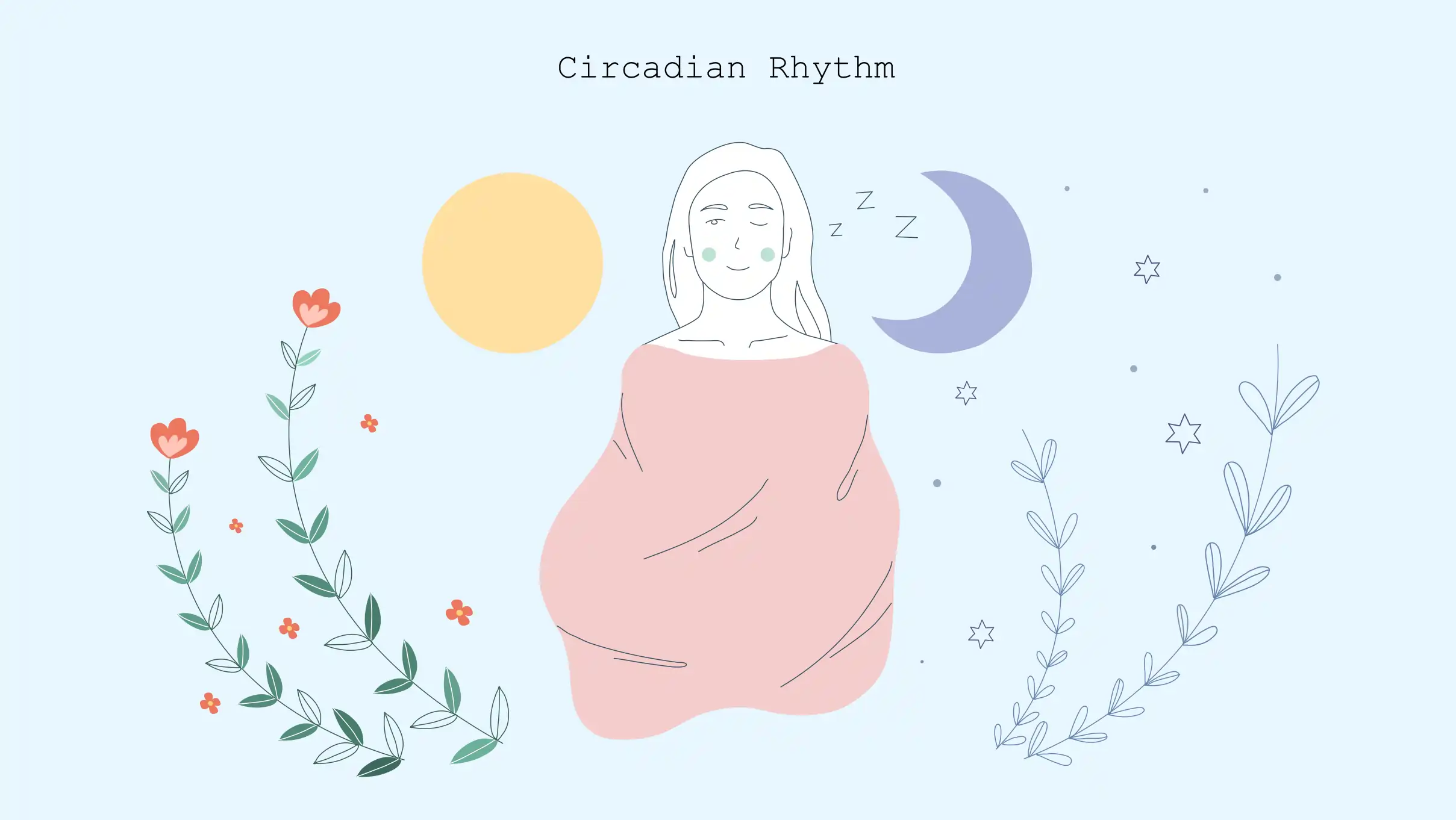What Is Circadian Rhythm?
Written by


Table Of Content
Circadian rhythm is our body’s internal clock that primarily responds to light and dark. The physical, behavioural, and mental changes follow a 24-hour cycle. The circadian rhythm’s main responsibility is regulating the sleep-wake cycle. And one of the best examples of circadian rhythm is that we sleep at night and feel active and energetic during the day. But there is more. This article will walk you through everything you must know about circadian rhythm and how it works. Read ahead!
What is circadian rhythm?
As aforementioned, circadian rhythm is our body’s internal 24-hour clock that regulates sleep and wakefulness. Our circadian rhythm is influenced by light and dark and various other factors. Based on your environment, your brain receives the signal, producing certain hormones and altering your body’s temperature. It also stimulates your metabolism to tell you if it is time to sleep or wake up. This is circadian rhythm meaning.
How Does Circadian Rhythm Work?
Now, let’s take a look at how circadian rhythm works. There are various components that come together to form the circadian rhythm.
Circadian rhythm in babies
A newborn baby develops a circadian rhythm after its birth. As the baby turns 8 weeks old, the cortisol rhythm is developed. By 9 weeks, melatonin and sleep efficiency tend to make their way, and finally, the body temperature and circadian genes develop by 11 weeks.
Circadian rhythm in teens
There is a shift in the circadian rhythm pre and post-puberty in teenagers. Before puberty, your body tends to make you sleepy by 8 to 9 PM. However, with puberty, the rhythm tends to shift a couple of hours, and you would feel sleepy by 10 or 11 PM.
Circadian rhythm in adults
Adults usually enjoy a consistent circadian rhythm as long as they practice healthy sleep habits. Here, your sleep and wake-up should remain stable, and you must aim to achieve at least 7 to 9 hours of sleep every night. Usually, melatonin is released in the body before midnight, so you tend to feel sleepy around that time. However, circadian rhythm tends to change as you age. Older adults generally go to sleep earlier and wake up sooner than later.
Is a Circadian Rhythm the Same As a Biological Clock?
No, circadian rhythm and a biological clock are not the same. Biological clocks are our body’s internal clock that manages various bodily processes, including circadian rhythm. Now, circadian rhythm is the byproduct of the biological clock. So, not all biological clocks can be categorized as circadian rhythms.
Circadian rhythm in babies
Circadian rhythms in babies are crucial for their sleep-wake cycles and overall development. These internal biological rhythms regulate the timing of essential processes like feeding, sleeping, and hormone production. However, newborns initially have an immature circadian system, resulting in irregular sleep patterns.
As they grow, parents can help establish a healthy circadian rhythm by providing consistent cues like exposure to natural light during the day and dim light at night. Gradually, babies develop a more synchronized circadian rhythm, leading to longer periods of nighttime sleep and improved daytime wakefulness. Creating a conducive environment can support their natural circadian development.
Circadian rhythm in teens
The circadian rhythm, or the internal body clock, plays a crucial role in regulating sleep-wake cycles and overall physiological processes. In teens, this rhythm undergoes natural changes due to biological and hormonal developments. Adolescents often experience a delay in their circadian rhythm, causing them to naturally feel more awake later in the evening and struggle with early morning wake-ups.
This shift can lead to sleep deprivation, affecting their mood, cognitive function, and academic performance. Understanding and respecting teens’ circadian rhythm is vital, as it enables the development of sleep schedules that align with their biological needs, promoting optimal health and well-being.
Circadian rhythm in adults
The circadian rhythm in adults refers to the natural, internal process that regulates their sleep-wake cycle and various physiological functions over a 24-hour period. It is influenced by environmental cues such as light and darkness, which help synchronize the body’s biological clock.
The circadian rhythm affects crucial aspects of adult life, including hormone secretion, body temperature, metabolism, and cognitive performance. Disruptions to this rhythm, such as shift work or jet lag, can lead to sleep disorders, mood disturbances, and compromised overall health. Maintaining a consistent sleep schedule, exposure to natural light during the day, and adopting good sleep hygiene practices are essential for promoting a healthy circadian rhythm in adults.
How do circadian rhythms affect health?
Circadian rhythm is essential for your body to carry out various functions. The main one is maintaining good sleep patterns. It also helps regulate your hormones, body temperature, and eating habits. When your circadian rhythm doesn’t work as it is supposed to, it can adversely affect your health. It has been associated with several health issues, such as diabetes, depression, and obesity.
Factors that can change circadian rhythms
A few factors that can change or affect the circadian rhythm include;
- Pregnancy
- Shift work
- Jet lag or changes in the time zones
- Medications
- Health disorders, such as Parkinson’s disease or Alzheimer’s
- Make a few changes in your daily routine, such as staying up late to work or read
- Menopause
- Mental health issues
How To Maintain a Healthy Circadian Rhythm
Now that you know all the factors that can change the circadian rhythm, let’s look at all the tips that will help you maintain it.
Seek out the sun:
When you step out in the sunlight first thing in the morning, it helps strengthen your circadian cue.
Follow a consistent sleep schedule:
This is a significant step in maintaining a healthy circadian rhythm, and that is to sleep and wake up at a consistent time.
Get daily exercise:
Physical activity during the day can help reinforce your circadian rhythm and helps you easily fall asleep at night.
Avoid caffeine:
While a cup of coffee can give you some much-needed energy in the morning, having it post 12 PM can hamper your sleep as coffee stays in your system for at least 10 hours.
Limit light before bed:
Light can interfere with your sleep. Therefore, it is important to keep the lights dim at night and avoid using any electronics at least an hour before bed.
Keep naps short and early in the afternoon:
Long naps can push your bedtime and hamper your sleep schedule. Therefore, it is always important to keep afternoon naps very short.
Following these steps can helps strengthen your circadian rhythm and ensure you enjoy a deep slumber at night.
When to Seek Doctor’s Help
You must talk to your doctor if;
- You have been having trouble sleeping or have been sleeping poorly for more than a month now.
- You notice difficulty in concentrating, forgetfulness, and severe daytime sleepiness due to poor sleep quality.
- You feel tired even after a good night’s sleep.
- You don’t feel fresh when you wake up.
Conclusion
Now you know everything there is to know about circadian rhythm. It is an important factor that helps regulate your sleep-wake cycle. Therefore, it is always wise to keep the circadian rhythm stable.
FAQs
Does the body make and keep its own circadian rhythms?
Yes, natural factors that take place in the body produce circadian rhythms.
How are circadian rhythms related to jet lag?
Jet lag occurs when you travel between time zones and this can put the circadian rhythm out of sync.
What are the 4 circadian rhythms?
The type of circadian rhythms are;
Diurnal: Night and day
Circadian: 24-hour cycle
Ultradian: Less than 24 hours
Infradian or Circalunar: 1 month
What happens if your circadian rhythm is out of whack?
When your circadian rhythm is hampered, it can disrupt your sleep-wake cycle, reduce your focus, diminish attention, and even low memory.
What is an example of a circadian rhythm?
One of the best examples of circadian rhythm is you sleep at night and wake up in the morning.
people like this article
Written by






